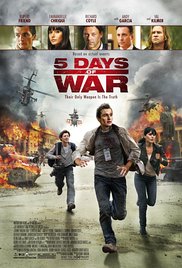
5 DAYS IN AUGUST/ 5 DAYS OF WAR
US/ Georgia, 2011, 113 minutes, Colour.
Rupert Friend, Emmanuelle Chriqui, Richard Coyle, Heather Graham, Jonathon Schaech, Rade Serbedzija, Andy Garcia, Val Kilmer, Kenneth Cranham, Dean Cain.
Directed by Renny Harlin.
Which five days of war, in which August? The answer is early August, 2008, when Russia and Georgia were involved in a short war over the region of Southern Ossetia and whether it belonged to Russia or to Georgia. The Russians invaded – and are still in occupation.
The treatment of war is much the same as in many similar films. The interest is in being offered a glimpse of the war, the people, the suffering, the political issues, the response of the Russian leadership of Medvedev and Putin, the decisions of the Georgian leadership. While there are scenes of battle, the focus, in fact, is on foreign journalists and their role in bringing images of atrocities to the world’s attention (even when the networks show no interest and are concentrating on the opening of the Beijing Olympics).
There is no doubt that the film is on the side of Georgia. The Russians are presented as barbaric invaders. Some commentators have felt that the film is propaganda. Others argue that it is not propaganda even though it firmly presents the views of Georgia. There is an underlying desire in the screenplay, despite the war and cruelty, for peace and freedom. And the film opens with the quotation about the first casualty of war being truth. There is also a statistic that in the past decade over 5000 journalists have been killed in war situations.
The film opens in Iraq 2007 where casual chat on the way to an interview is prelude to a deadly ambush. The central character, journalist Tom Anders (Rupert Friend) and his cameraman Sebastian Ganz (Richard Coyle) go to Georgia at the invitation of their journalist friend, Dutchman (Val Kilmer). As the war breaks out and there are uncertainties, they go up country and film a local wedding which, we know, is going to be bombed. What follows is a rescue of the bride, her sister who has been educated in the US, and their South Ossetian father. They are helped, and later rescued, by a Georgian fighter (Jonathan Schaech), but they also have to hide and witness atrocities carried out by a Cossack soldier. They are captured and interrogated to find the memory card with the incriminating footage, especially by a Russian commander (Rade Serbedzija) whose son was killed in Afghanistan and who has a world-weary view of war.
In the meantime, the president (Andy Garcia) and his cabinet are appealing for US help, not forthcoming, and for help from the European Union (eventually).
To a large extent, the material is familiar, characters and situations from other war films: the bawdy journalistic chat and drinking, the heroic rescues, the split second rescues, the rounding up of the innocent, the long marches of people displaced.
Director, Renny Harlin, is better known as a director of action films like Cliffhanger and The Long Kiss Goodnight.
Despite these limitations and the fact that the hero is not particularly likeable, we become involved in the crises, perhaps remembering this war vaguely, how it impinged (or did not) on our consciousness, and being reminded of so many similar (and worse) wars in our time.
1. Topical drama? Especially at the time? The discussion about whether the film was propaganda or not?
2. A reflection of conflicts in the, especially with Putin Russia? The situation of Georgia? The title, the focus on the war and the attack? Media response – and the irony of the world concerned about the Beijing Olympics at the time?
3. Russia, Georgia, Ossetia?
4. The opening in Iraq, the setting of the 21st century war and occupation, the mentality? The reporter, her death? The locations, ambush?
5. Georgia, Tblisi, the countryside? The Russian forces, the local forces? The attacks, bombardments, people, migrants?
6. The wedding sequence, bombardment, the rescue?
7. The focus on the journalists, their work, the difficult situations, embedded? Journalists rights?
8. Tom Anders, Sebastien Ganz, journalist and photographer? The contact with the Dutchman? His influence? The transfer?
9. The two travelling the country, the wedding, the bride, the system, the father, the attack, the escape?
10. The local fighter, his encountering the journalists in Iraq?
11. The Cossacks, atrocities?
12. Capture of the journalists, the interrogation, the commander, his son’s story, his weariness with war?
13. Georgia, the president, the meetings, the politicians, wanting help from the United States, from the European Union?
14. The work of the director, his tradition of action films, conventions of fighting, battles, escapes? Rescues? Innocent victims, displaced
people?
15. A film of action, yet significant at its time for the issues?
16. The final testimonials?